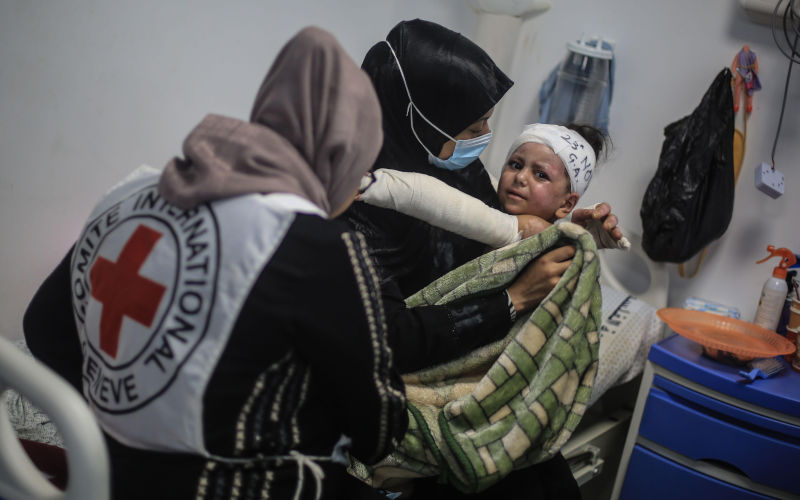People in Gaza are experiencing a living hell
December 14, 2023
As the death toll in Gaza from Israels bombardment and siege reaches well over 17,000 people, the Australian Government is slowly and belatedly taking steps towards ending the nightmare for the people there.
On Wednesday Prime Minister Anthony Albanese announced, with his counterparts in New Zealand and Canada, support for urgent international “efforts” towards a sustainable ceasefire. This week Australia has also voted in favour of a UN General Assembly resolution demanding an immediate humanitarian ceasefire, having abstained on a similar resolution on 27 October.
These steps are very welcome, and may help to restore some faith in Australias capacity to respond appropriately to such appalling suffering as has been repeatedly reported from Gaza over the past two months. The tragedy of the lost opportunities for Australia to act much sooner cannot be undone and will remain a shameful part of our history. Our government must now do much more.
A snapshot of what health and other agencies have been reporting, even in the last fortnight since the bombing of Gaza resumed on 1 December after a brief pause, tell us why more is desperately needed.
On 4 December the International President of Mdecins Sans Frontieres (MSF), Dr Christos Christou, wrote an open letter to the UN Security Council, pleading for an immediate ceasefire. He said: Words fail us to describe the absolute horror being inflicted on Palestinian civiliansIsrael has shown a blatant and total disregard for the protection of Gazas medical facilities.
On 5 December, WHO reported that the situation for the people of Gaza was getting worse by the hour, with hundreds of people killed and many hundreds more injured in a single day.
On 7 December, Dr Tlaleng Mofokeng, UN Special Rapporteur on the right to health, said that Israel had declared an unrelenting war on the health system in Gaza and that the healthcare infrastructure in the Gaza strip has been completely obliterated. She also reinforced the message of many others that the root causes of the conflict must be addressed and that the Israeli military occupation of Palestinian territory must end.
On 7 December also, UNICEF reported that the extent of trauma in Gaza is utterly unprecedented. On 8 December the Deputy Director of the UN World Food Program (WFP), Carl Skau, wrote after a visit to Gaza that people there are starving, with WFP operations on the verge of collapse.
With such reports, its important that we examine how far Australias position actually goes.
The statement by the Australian, New Zealand and Canadian leaders strongly and appropriately condemned Hamas for its heinous acts of violence and taking of hostages. However, there was no explicit condemnation of Israel and its grossly disproportionate actions.
Clearly there are still different sets of rules being applied. In addition the statements call for urgent international efforts towards a sustainable ceasefire (emphasis added) falls significantly short of the demands of MSF and others for an immediate ceasefire.
Actions matter
Even more important than Australias words are our actions.
What pressure is Australia applying to demonstrate that we will not be complicit with nations that commit war crimes? Thus far, theres been very little.
Despite Defence Department claims that our weapons exports are assessed for any risk of facilitating serious human rights abuses, there has been no announcement of the suspension of Australian weapons exports to Israel.
World leaders are speaking out on this, however.
On 4 December The Elders, a group that includes former national and UN leaders, called for governments that are providing military assistance to Israel to review their approach, warning that Israels renewed military campaign in Gaza risks fuelling an escalating cycle of mass atrocities. Without urgent action to prevent more Australian weapons being exported to Israel, we risk being complicit in such atrocities.
Others are leading the way in applying strong political pressure too. In South Africa a nation that suffered under apartheid for too long while the world looked away lawmakers voted on 21 November in favour of closing down the Israeli embassy in Pretoria and suspending all diplomatic relations until a ceasefire is agreed in its war with Hamas.
Beyond applying such military and political pressure with teeth, Australia should call for the International Criminal Court to investigate all allegations of war crimes in this war. The very many thousands of victims deserve no less, and accountability for war crimes is imperative.
Finally, it is important to acknowledge the ongoing role of civil society in Australia in urging recognition from our government of the plight of the people of Gaza, and the need to address it.
Many Palestinians, Jews and others have taken personal risks to advocate for civilians in Gaza. Healthcare workers speaking out for the protection of medical facilities and patients in Gaza have faced professional threats, including being reported to the Australian Health Practitioner Regulation Agency (Ahpra).
We owe them all a debt of gratitude. Similarly the efforts of parliamentarians who are speaking out are to be applauded. All of this must continue, because there is a long way to go yet. Readers are encouraged to take action: see here.
The words of UN rapporteur Dr Mofokeng explain whats at stake, in addition to the lives of over 2 million people in Gaza: The practice of medicine is under attackWe are in the darkest time for the right to health in our lifetimes.
First published in Croakey Health Media on December 14, 2023.

